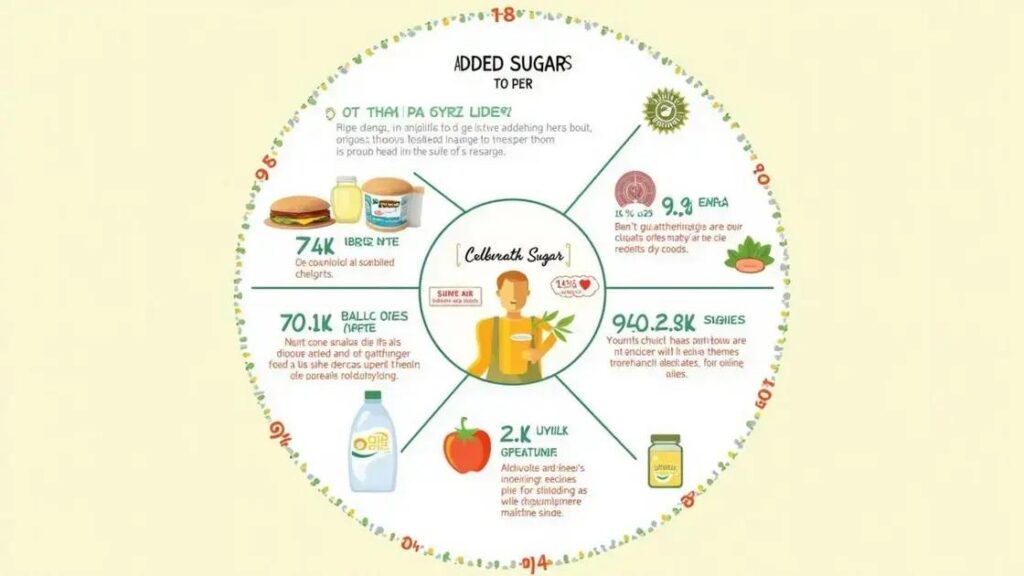Reducing added sugars in your diet is crucial for better health, as it helps prevent obesity, heart disease, and diabetes. By identifying added sugars in processed foods, understanding their impact, and making healthier choices, you can enjoy benefits like improved energy levels, weight management, and enhanced mood.
In today’s fast-paced world, the importance of avoiding added sugars in processed foods cannot be overstated. Many consumers are unaware of how prevalent these sugars are in everyday diets. By understanding what added sugars are, the health risks they pose, and how to identify them in ingredient lists, individuals can take significant steps toward healthier eating. This article dives into why avoiding these sugars improves overall health, practical tips for reducing them, and the myriad benefits of living sugar-free.
Understanding Added Sugars in Processed Foods
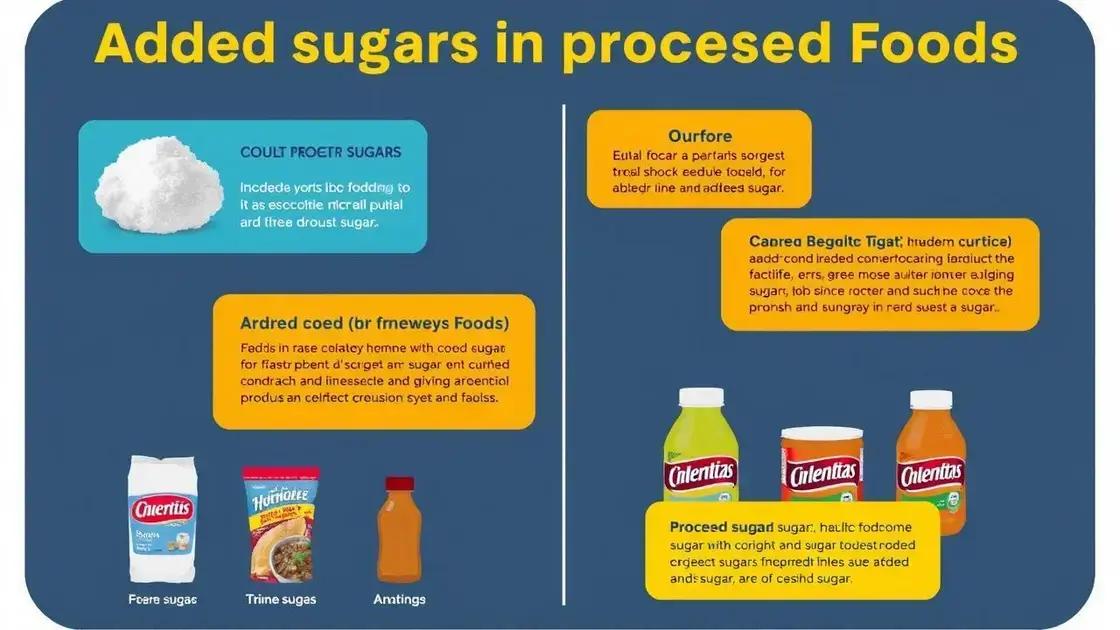
Understanding added sugars in processed foods is essential for maintaining a healthy diet. Added sugars are sugars that are included in foods during processing or preparation. Unlike natural sugars found in fruits and dairy, added sugars do not occur naturally; they are typically introduced for taste, texture, or preservation.
Many processed foods contain significant amounts of added sugars, including items such as soft drinks, candy, baked goods, and even some sauces and condiments. Identifying these sugars on ingredient labels can be tricky. Common names for added sugars include high fructose corn syrup, cane sugar, and honey.
Why Are Added Sugars Used?
Manufacturers often use added sugars for several reasons. Primarily, they enhance flavor, making products more appealing to consumers. Added sugars can also improve the texture and extend the shelf life of products. However, while they may taste good, they can contribute to numerous health problems.
How to Recognize Added Sugars
When trying to avoid added sugars, it’s important to read packaging labels carefully. Look for terms like “syrup,” “sugar,” and “sweetener” on the list of ingredients. Even seemingly healthy foods can contain added sugars, which can lead to unintended sugar consumption.
Some products claim to be “sugar-free” but can still contain sugar alcohols or artificial sweeteners, which also affect blood sugar levels. Therefore, becoming informed about these alternatives is equally as critical.
Impact on Health
Research shows that excessive consumption of added sugars can lead to various health issues, including obesity, heart disease, and diabetes. By understanding what added sugars are and where they can be found, it becomes easier to make informed dietary choices.
Health Risks of Consuming Added Sugars
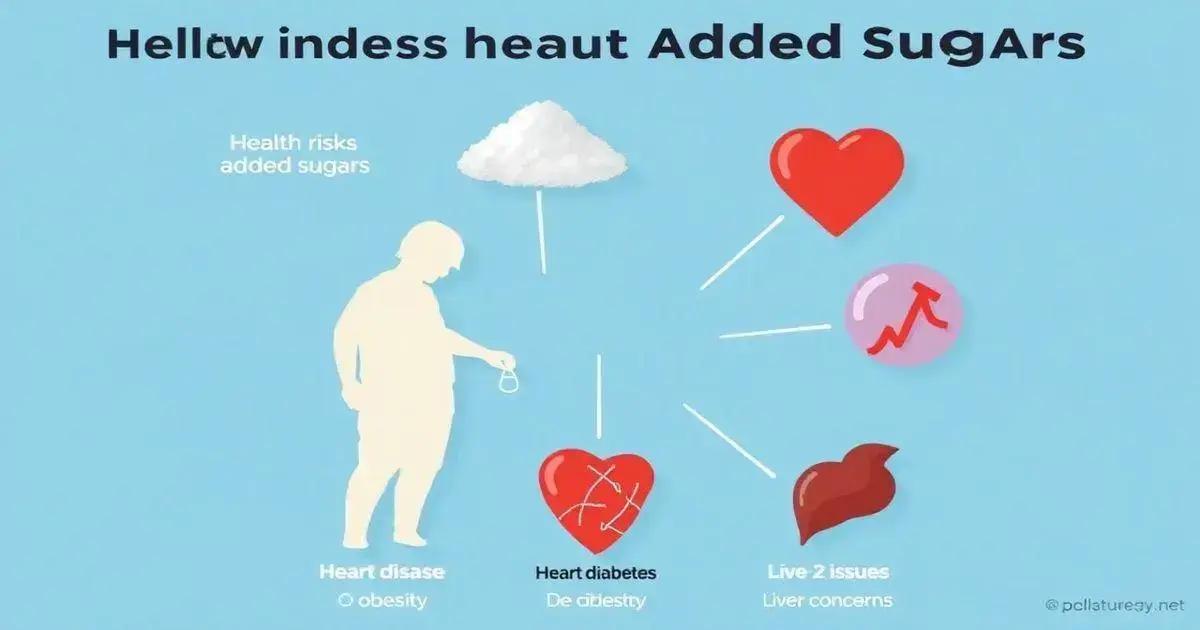
Consuming high amounts of added sugars can lead to a range of serious health risks. One of the most prominent concerns is obesity. Foods high in added sugars are often low in nutrients, which can result in overeating. When people consume sugary foods, they tend to consume more calories overall, leading to weight gain.
Heart disease is another major health risk. Studies have shown a connection between high sugar consumption and various heart problems. Excess sugar can increase blood pressure, inflammation, and levels of triglycerides, all of which are risk factors for heart disease.
Type 2 Diabetes
Excessive added sugar intake is linked to a higher risk of type 2 diabetes. Sugar can lead to insulin resistance, a condition where the body’s cells do not respond properly to insulin. This complicates blood sugar regulation and elevates the risk of developing diabetes.
Dental Issues
Dental health is also at risk. Added sugars contribute to the growth of harmful bacteria and acid in the mouth, leading to cavities and gum disease. Maintaining healthy teeth requires reducing sugar consumption.
Livers and Metabolic Health
Another concern is how added sugars affect liver health. Excessive fructose from added sugars can lead to conditions like non-alcoholic fatty liver disease (NAFLD), which can negatively impact metabolic health.
In summary, the health risks associated with consuming added sugars are serious and far-reaching. Identifying and reducing added sugars in your diet is essential for maintaining overall health and preventing chronic diseases.
Tips for Identifying Added Sugars
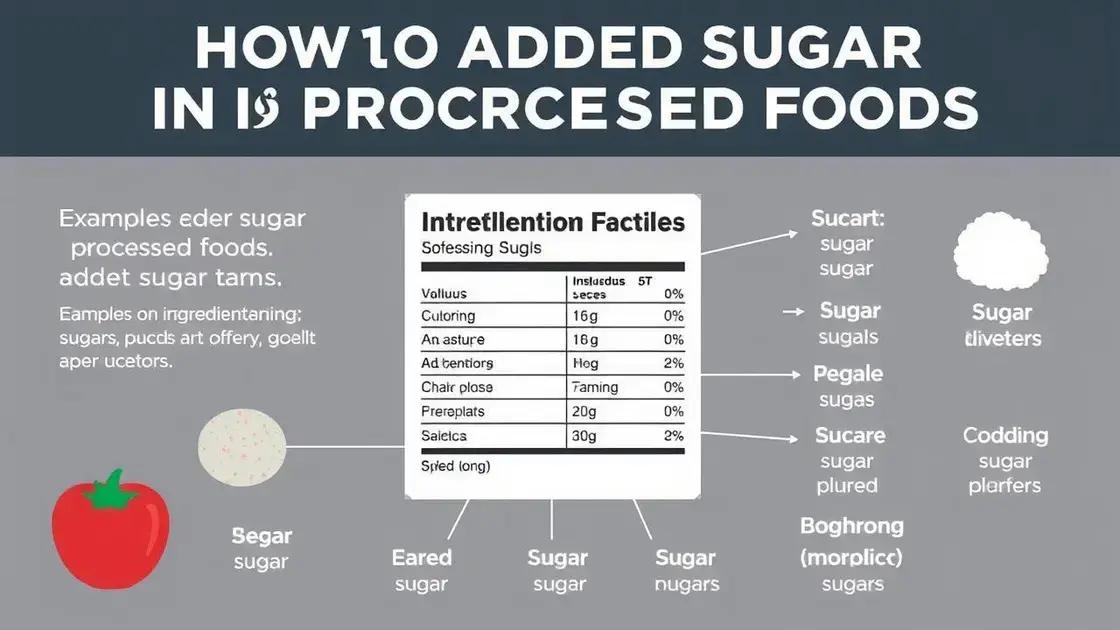
Identifying added sugars in foods can be challenging, but using the right strategies can help. Here are some tips for effectively spotting added sugars in processed foods.
Read Ingredient Labels
The first step to identifying added sugars is to carefully read the ingredient labels on food packages. Ingredients are listed in order of quantity, with the most significant components listed first. If sugar or any of its synonyms is near the top of the list, it signals a high added sugar content.
Know the Different Names for Sugar
Added sugars come in various forms, and they often have different names. Terms such as high fructose corn syrup, cane sugar, dextrose, and agave nectar all indicate added sugars. Increasing your awareness of these names will help you make better choices.
Watch for Snack Foods
Many snack foods, including granola bars, yogurt, and even salad dressings, often contain hidden added sugars. Review their labels, and try to choose products without added sugars whenever possible.
Understand the Different Forms of Sugar
Sugars can appear in solid and liquid forms. Both types can impact your health similarly. Pay close attention to ingredients like syrups, honey, and fruit juices, which can also contain high sugar levels.
Lastly, remember that just because a food claims to be healthy does not mean it is free of added sugars. Always verify with the ingredient list.
Benefits of Reducing Added Sugars in Your Diet
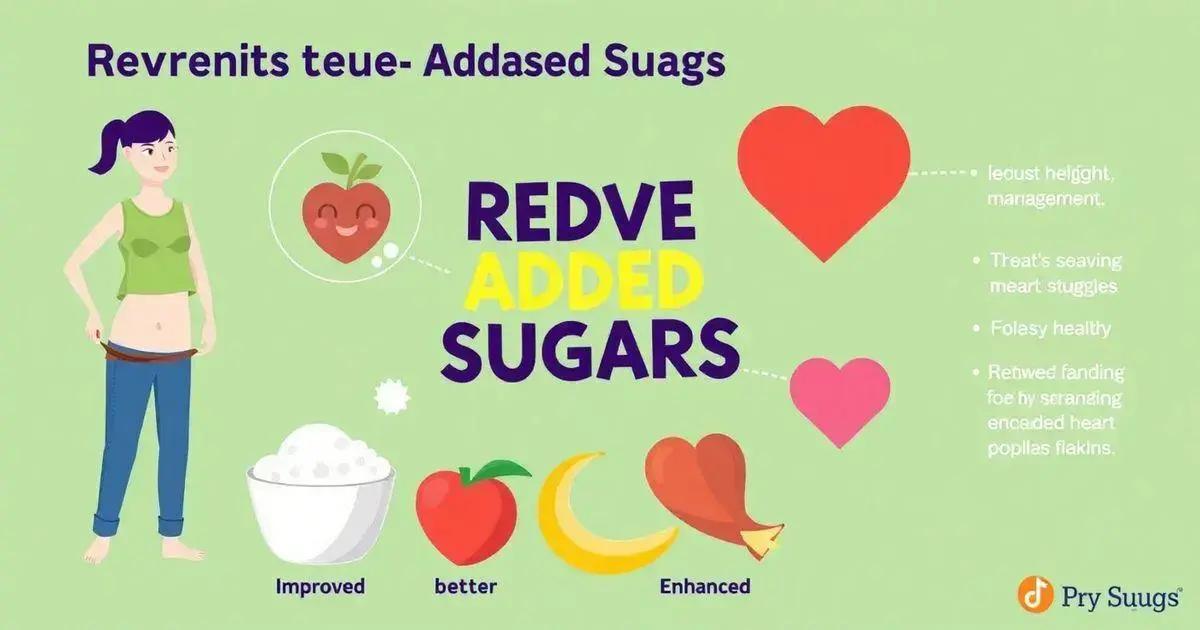
Reducing added sugars in your diet offers a range of significant benefits for your overall health. Here are some key advantages of cutting back on added sugars.
Weight Management
One of the most noticeable benefits of lowering added sugar consumption is weight management. Foods high in added sugars provide empty calories, which can lead to weight gain. By eliminating these sugars, individuals can help control their caloric intake and maintain a healthier weight.
Improved Energy Levels
Reducing sugars can lead to more stable energy levels throughout the day. When you consume high amounts of sugar, you may experience spikes and dips in energy. Lowering added sugars can result in more consistent energy and better overall vitality.
Better Heart Health
Another crucial benefit is improved heart health. Studies show that reducing sugar intake can lower blood pressure and reduce inflammation, both of which contribute to a healthier cardiovascular system.
Enhanced Mood
A diet lower in added sugars may also enhance your mood. Consuming less sugar can help prevent mood swings and anxiety that often result from sugar crashes. Many people report feeling better when they limit their sugar intake.
Lastly, lowering added sugars can promote healthier eating habits overall. When you focus on reducing sugary foods, you often end up opting for healthier alternatives, enhancing your overall diet.
Take Control of Your Health by Reducing Added Sugars
Reducing added sugars in your diet is vital for maintaining good health and preventing chronic diseases. By understanding how to identify added sugars in processed foods, you can make informed choices that promote better nutrition.
The benefits of cutting back on these sugars extend beyond just weight management; they include improved energy levels, better heart health, and enhanced mood. Every positive change contributes to a healthier lifestyle.
Making gradual shifts in your diet can lead to lasting benefits. Focus on reading labels, choosing whole foods, and exploring healthier alternatives. The journey to reducing added sugars is essential for your well-being and can lead to a more vibrant, energetic life.
FAQ – Frequently Asked Questions About Added Sugars
What are added sugars?
Added sugars are any sugars or caloric sweeteners that are added to foods during processing or preparation. They are different from natural sugars found in fruits and dairy.
Why should I avoid added sugars?
Avoiding added sugars is essential for reducing the risk of obesity, heart disease, and type 2 diabetes. It helps maintain a healthier weight and enhances overall well-being.
How can I identify added sugars in processed foods?
Read ingredient labels carefully. Look for terms like ‘high fructose corn syrup’, ‘sucrose’, and ‘glucose’. These indicate that added sugars are present in the product.
What are the benefits of reducing added sugars in my diet?
Reducing added sugars can lead to better weight management, improved energy levels, enhanced mood, and better heart health.
Can I still enjoy sweet foods while reducing added sugars?
Yes! You can enjoy natural sweeteners like fruit or use alternatives such as honey in moderation. Focus on whole foods for sweetness.
What are some tips for reducing added sugars in my diet?
Choose whole foods over processed ones, read ingredient labels, limit sugary drinks, and explore healthier snack options to cut back on added sugars.

